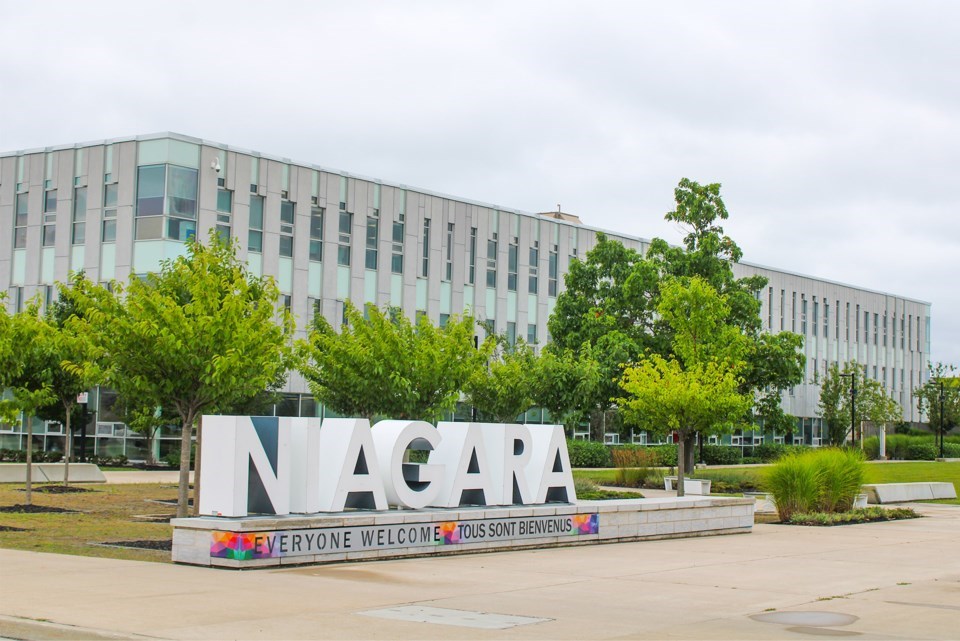Niagara Region has changed its previous stance on banning signage, including banners, props, placards or flags, indoors at council meetings.
At Thursday’s regular council meeting, regional politicians were tasked with ratifying a bylaw that would rubber-stamp an approval given in late July to prohibit these material forms of expression in the public gallery.
But on Thursday, Niagara Falls Regional Coun. Joyce Morocco offered an amendment to the bylaw saying that such signage would be allowed if it doesn’t include defamatory or offensive language, or hate speech.
It must not be directed at specific individuals, nor can it have a “solid backing” or “hard handles,” Morocco said while reading her proposed amendment. Her recommendation included that such signage must not interfere with business being conducted at meetings.
This matter is one that has drawn criticism toward the region in the past.
Opposition from the Niagara Palestine Coalition first surfaced when regional councillors voted to update its outdoor flag-raising and sign-lighting policy, despite an outcry from the local Palestinian community vocalizing their concerns about the Region not allowing imagery representing their home country, such as flags and on digital signage, to be displayed at Niagara Region sites. That policy referring to the outdoor flags and digital signs has not changed.
Recently, an advocacy group warned regional council that it could face legal challenges over the proposed procedural bylaw that includes a ban on signs, flags, props, and placards in the public gallery should they decide to approve it Thursday.
Christine Van Geyn, litigation director for the Canadian Constitution Foundation, in Calgary, said that should the amended bylaw come into force it is “highly vulnerable” to a constitutional challenge.
The group maintains that the ban on the kinds of signs outlined in the bylaw violated Section 1 of the Canadian Charter of Rights and Freedoms, which guarantees the right to free expression, and that should the bylaw be passed, the CCF would be challenging it.
The changes originally approved on July 25 were opposed only by St. Catharines Regional Coun. Haley Bateman and Pelham Mayor Marvin Junkin.
Bateman applauded the shift on this issue brought forward by Morocco, saying these changes are “very important,” and that “props do have a place in the council chambers.”
Junkin did not offer any comments during the discussion Thursday night.
Lincoln Mayor Sandra Easton said the ban on signage that the regional council originally agreed to is “standard policy in many communities,” but that she supported Morocco’s amendment.
“If this assists with easing concern, we should try whatever will work,” she said.
St. Catharines Regional Coun. Laura Ip said the wording tabled by Morocco on Thursday was also considered by the Region’s procedural bylaw committee in May, and that she liked that proposal when it was before council Thursday as an amendment.
“I think being silent on signs to a full ban is too strict of a move,” she said.
These comments were made while discussing Morocco’s amendment, and when the balance of the bylaw was on the floor, no comments or questions were presented.
The bylaw as approved also states that members of the public “may not applaud, heckle, make audible demonstrations of support or opposition, engage in conversation or display any other behaviour which may be considered to be disruptive, inconsiderate, disrespectful or intimidating to others.”
As well, the procedural bylaw says councillors should refrain from “conversing or fraternizing with members of the public or delegates in the gallery while council or committee is in session. This includes leaving the council chamber to engage with members of the public or standing in the gallery while council or committee is in session.”
The Niagara Palestine Coalition released a statement Friday on the amended bylaw approved Thursday, saying it remains opposed to sections that haven’t changed, including the ban on “fraternization during sessions, i.e. Councillors interacting with the voters who elect them,” the ban on “correspondence criticizing specific Councillors, saying these should be sent to the Integrity Commissioner, who only considers Code of Conduct violations,” and requiring “detailed speaking notes in advance from delegates as an additional hurdle.”
Niagara-on-the-Lake Regional Coun. Andrea Kaiser told the NOTL Local Friday morning that the amendment brought forward by Morocco is “a really good move," she was able to support it.
“I think it goes a long way to address some of the concerns we did hear” during earlier discussions, she said, noting while it’s important to allow people to have a voice, they must be held to rules that contribute to safe and productive meetings.
“I expect to be able to work in a good environment,” said Kaiser, adding that Morocco’s amendment “landed in a really good place.”
